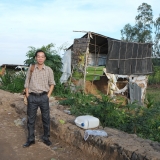AbstractThe interplay of climate change, upstream hydropower development, and local water engineering interventions for agricultural production contributes substantially to the transformation of waterscapes and water scarcity in the Vietnamese Mekong Delta. This paper aims to examine how these dynamics are linked to the paradigm shift in water management in An Giang and Ben Tre, the two ecologically distinct provinces that face serious water scarcity in the delta. We used the adaptive management concept to examine how state-led policy directions from food security towards water security enable change in water management that gives priority to water retention. While policy learning is evident, questions remain about how this ad-hoc solution could help address the presently acute water scarcity and water security over the long term. The paper advocates achieving water security should focus not only on diplomatic interventions into upstream climate-development complexities but also local water-livelihood politics.
Evolving pathways towards water security in the Vietnamese Mekong Delta: An adaptive management perspective
EfD Authors
Country
Sustainable Development Goals
Publication reference
Tran, T. A., Tran, D. D., Van Vo, O., Pham, V. H. T., Van Tran, H., Yong, M. L., Le, P. V., & Dang, P. T. (2024). Evolving pathways towards water security in the Vietnamese Mekong Delta: An adaptive management perspective. Ambio. https://doi.org/10.1007/s13280-024-02045-0
